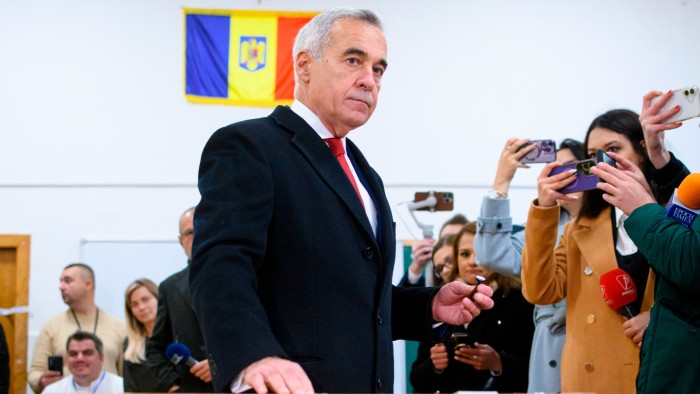Unlock the Editor’s Digest for free
Roula Khalaf, Editor of the FT, selects her favourite stories in this weekly newsletter.
An unprecedented presidential vote recount in Romania has shown no marked difference from the original results, confirming the lead of pro-Russia nationalist Călin Georgescu, who will face liberal leader Elena Lasconi in the run-off on Sunday.
The country’s top court last week took the step of ordering a recount amid fears of election interference from Russia, given the surprise result that showed Georgescu top the first round of the vote.
The court on Monday certified the election result after the recount found no significant differences from the original tally, with Georgescu and Lasconi having qualified for a run-off scheduled for December 8.
Cancelling the first-round results would have turned Georgescu into a “martyr”, warned Iulian Fota the foreign ministry’s state secretary for strategic affairs. He described the court’s decision to recount the vote as a “mistake” that fuelled “rumours and conspiracy theories” and discredited the electoral process.
Romania’s western partners are worried about a key ally turning towards Moscow, as Bucharest is a Nato and EU member that has so far supported western efforts to back Ukraine in its defence against Russian aggression.
Georgescu last week denied wanting to take Romania out of the US-led military alliance and said that he instead wanted to “renegotiate” the terms of its membership.
Lasconi on Monday thanked the court for “not playing Russian roulette with Romanian democracy” and urged all politicians “not to take our country off-course”.
Romania’s mainstream parties were meanwhile on course to retain control of the country’s parliament after legislative elections last Sunday, despite big gains by nationalist far-right groups that are supporting Georgescu for president.
At 22.5 per cent, Ciolacu’s centre-left PSD party won the largest share of the vote in the election, after nearly all votes were counted on Monday, followed by the nationalist far-right AUR on 18 per cent.
Besides AUR, two smaller far right, pro-Russia parties backing Georgescu also entered parliament — SOS Romania party and the upstart Party of Young People (POT), with their cumulative results reaching a third of the vote.
The centre-right PNL, Lasconi’s USR party and the Hungarian minority UDMR party won another third of the ballot. All mainstream parties with the exception of PSD have backed Lasconi for president.
“It’s unclear whether PSD voters will support Lasconi even if their party endorses her,” Aarhus University researcher Costin Ciobanu said. “Some proportion may end up backing Georgescu as PSD and the liberals have a contentious history. A strong pro-European message may help convince a majority of them to support Lasconi, if reluctantly.”
Coalition talks are expected to start this week, including for a broad alliance of pro-western forces that would keep the “sovereigntists” at bay.
Given the highly fragmented parliament, “the formation of a pro-democratic and Euro-Atlantic majority will not be easy,” Ciobanu said. “But it is a necessity given what a radical-right president and/or government could bring about for Romania.”
Mainstream political leaders stressed the need to overcome their differences and focus on the cordon sanitaire around the far right.
“We must adopt in Romania the same strategy that works at the European level: building a pro-European political majority and isolating extremists and populists,” Romanian MEP Siegfried Mureșan, vice-chair of the EPP group and the European parliament, said on Monday.
“We also need to address foreign interference in elections in EU member states more effectively. The rise of extremism in Romania is clearly linked to Russian propaganda.”
Read the full article here




